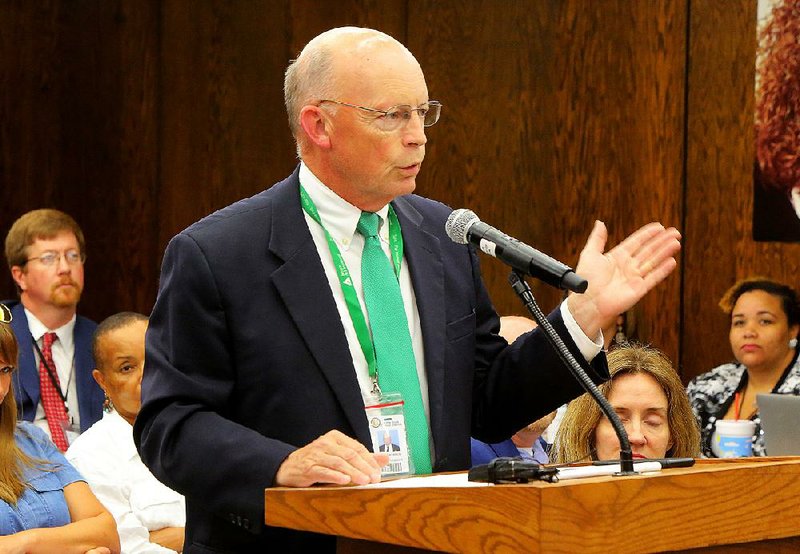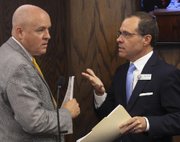Two school district superintendents and the Arkansas Department of Education's director of charter schools gave a state committee of Little Rock-area community members differing views Wednesday on charter schools in Pulaski County.
Little Rock Superintendent Baker Kurrus, whose last day on the job is today, told the group that charter schools duplicate facilities and services that are already available in the Little School District and that expanding charter schools is an expensive and wasteful investment of public funds.
"People are leaving the Little Rock schools not because the schools are failing but because they want different opportunities, and the state owes nobody that," Kurrus told the seven-member Little Rock Area Public Education Stakeholder Group that is responsible finding ways to increase collaboration and coordination among the different school types.
Pulaski County Special Superintendent Jerry Guess called for a period of stability in the Pulaski County school districts after decades of turmoil resulting from the long-running Pulaski County federal school desegregation lawsuit. Guess echoed some of Kurrus' sentiments on charter schools, saying that the schools are taking the brightest and easiest students to educate, which threatens the ability of traditional schools to educate students who are more difficult to educate because of disabilities or language barriers.
Alexandra Boyd, the Education Department's public school program coordinator who manages charter-school applications and oversees charter-school compliance with state requirements, disputed that the state is operating dual public school systems in Pulaski County.
"The state is charged with educating students," she said. "We don't have a parallel systems. We have one public education system that is striving to educate students. Saying there are parallel systems is like saying a school district has a parallel system because it has more than one middle school," she said.
"You might think of it as a puzzle," Boyd said about public education. "Right now we don't have all the pieces of the puzzle, but charter schools are serving as some of the pieces for students. We want to provide avenues for students to be as successful as they can be."
Boyd described herself as being passionate about providing school choice for students and their families, adding that families with financial means have always had school choice in terms of being able to move to new communities or to select private and home schools. Charter schools give school choice to families without those same financial resources, she said while also acknowledging that the lack of school bus transportation for many charter schools can be a barrier to some families.
The Little Rock-area stakeholder group was created by the Arkansas Board of Education when it voted in April to hire a "research facilitator" to make recommendations on how the board might better manage its decision-making and promote collaboration in regard to traditional and charter schools. The stakeholder group of individuals representing the different kinds of schools in Little Rock is to help identify the specific questions for the researcher or consultant to address.
The Education Board's call for guidance came after heated debate earlier this year over requests by the existing eStem and LISA Academy charter schools to open new campuses within the boundaries of the state-controlled Little Rock School District. The charter-school operators said the nearly 3,000 new seats at four new campuses -- which were approved -- are needed to help relieve long waiting lists of students wanting to enroll in the schools.
Arkansas Education Commissioner Johnny Key did not extend Kurrus' contract as head of the Little Rock district after Kurrus, an attorney and not an educator, opposed the charter-school expansions. Key then appointed Michael Poore, the superintendent of the Bentonville School District, to succeed Kurrus, saying that Poore, as a professional educator, could better address the academic issues that caused the state takeover of the system in January 2015.
Kurrus told the stakeholders group Wednesday that the district has focused on best practices in teaching and learning and that district students are achieving, as evidenced by school achievement data presented by the University of Arkansas at Fayetteville's Office for Innovation in Education. He also said "we've missed our chance" for collaboration and said it was a time for "truth-telling" in regard to charter-school landlords, lease agreements and loans.
Boyd later told the stakeholder group that charter-school operators must have their financial agreements and loans pre-approved by the Education Department and that information is available to the public through state Freedom of Information Act requests.
Stakeholder group member Antwan Phillips, an attorney, asked Kurrus about areas of potential collaboration between the charter and traditional schools. Kurrus said that the district's Carver Magnet Elementary School on East Sixth Street is a high-achieving but under-enrolled school not far from where eStem Charter Schools will open a new elementary school on Shall Street.
He also said that the district is planning a new high school in southwest Little Rock.
"Do we really need another high school at UALR?" Kurrus asked, referring to plans by eStem Charter Schools to move its downtown high school into a University of Arkansas at Little Rock building in 2017-18.
Poore, the new Little Rock superintendent, described for the group the efforts among Northwest Arkansas school districts to advertise the course offerings of their neighboring school districts to ensure that students would have access to the courses they needed or desired. "We viewed it as support for kids," he said.
Group member Tamika Edwards told Poore that in an environment of charter and traditional school competition for students, that would be like asking the Wal-Mart and Target stores to advertise each other's products.
"Is that a reasonable task for us?" Edwards asked. She also asked whether good sportsmanship was at play in the charter and traditional school operations and even whether the creation of the stakeholders' group was a farce -- "a way to pass the time while other plans are completed," she said.
Phillips told Edwards that he didn't want to be a part of any farce and that he is participating in the stakeholders' group because he believes the work can be meaningful and useful to the Education Department and state Education Board.
"I'm here in good faith," he said.
Group member Ann Brown Marshall questioned Education Board member Jay Barth of Little Rock about a committee study he led last year on school district boundary lines in Pulaski County, asking if the study considered two districts, one north and one south of the Arkansas River, as has been talked about for many years.
Barth said the formation of the new Jacksonville/North Pulaski School District -- permitted by a comprehensive settlement in a long-running school desegregation lawsuit -- prevented that kind of holistic approach he would have liked regarding school district boundary lines. Civic leaders in both Maumelle and Sherwood have taken preliminary steps to form their own school districts north of the river.
"Jacksonville created a precedent and, whether we love it or not, it is the reality," Barth said.
Group member Dianna Varady questioned Boyd about the enrollment of students with disabilities, particularly severe disabilities, in the charter schools. She said she was aware of cases where children were selected for enrollment only to be told that the schools could not serve them.
"That should never happen," Boyd said, adding that when she gets those reports she visits the school, and training is provided to the school staff on their obligations to provide services. She said that the longer a charter school operates, the greater the number of special needs students that are served. Parents are initially reluctant to enroll children who receive special education services in newly opened charter schools.
Metro on 06/30/2016

